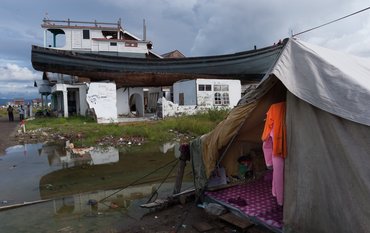11.02.2013|Potsdam: GFZ signs MoU and provides launcher - Today the Board of the German Research Centre for Geosciences has signed the Memorandum of Understanding with NASA Administrator Charles Bolden Jr. to mutually realize the follow-on mission of GRACE (Gravity Recovery and Climate Experiment). This agreement solidifies the joint long-term planning and realization of this unique tandem satellite mission, which will, after having successfully passed the „Preliminary Design Review“ in January, now enter it’s building phase to be launched in August 2017.
Professor Reinhard Hüttl, Scientific Board of the German Research Centre for Geosciences: „We are very happy that we can bring the GRACE Follow-On mission on its way together with our American friends and partners. With GRACE we already started in 2002 climate-related mass transport observations within System Earth. GRACE has more than doubled its originally planned lifetime of 5 years. Unfortunately, due to the aging of the dual satellites, after almost 12 years the GRACE lifetime draws to a close.”
The German contributions of GRACE-FO are in the charge of the German Research Centre for Geosciences. Project Manager Prof. Frank Flechtner explains: “It is already an enormous success that we gained climate and gravity observations from GRACE of more than a decade. But climate-related time series must be longer. With GRACE-FO, the currently available time series to observe and quantify polar ice melting, climate impacting ocean currents, and variations of the continental hydrological cycle including anthropogenic ground water depletion will be much more reliable.”
The German contributions defined in the Memorandum of Understanding include also the provision of a launcher for both satellites. Therefore, GFZ and its project partner SpaceTech GmbH (STI) initiated in 2012/13 a request for quotation and a feasibility study. As a result the DNEPR rocket has been chosen, a converted Russian SS18 which has been modified for scientific payloads. The DNEPR has a weight of 211 tons and a length of 34 metres. Both satellites shall be launched from Baikonur/Kazakhstan into their polar orbit at an initial altitude of 490 kilometres. The satellites will fly on the same track with a separation of about 220 km. The corresponding contract with the International Space Company Kosmotras (ISCK) has been signed recently by GFZ and ISCK. Management of the launcher and the launch services will be performed by STI under subcontract of GFZ.
Germany does not only provide the launcher but also optical elements of a „Laser Ranging Interferometers (LRI)“. The distance measurement between the current dual GRACE satellites which has been performed so far with an accuracy of about two thousands of a millimeter using microwave signals. This shall be improved for GRACE-FO by this new technology by a factor of up to 20. This is important as the prime signal to monitor gravity field variations is the change in separation between both satellites. The LRI design is provided by the Max-Planck-Institute for Gravitational Physics (Albert-Einstein-Institute), the flight hardware will be delivered by STI.
Besides NASA´s Jet Propulsion Laboratory (JPL) and the University of Texas, GFZ is again responsible for science data processing. Funding of the German contributions is jointly provided by the German Ministry of Education and Research, the German Ministry of Economics and Technology and the Helmholtz Foundation. The German Aerospace Center DLR provides in-kind contributions for the LRI. Besides this, GFZ provides Laser Retro-Reflectors for both satellites and funds the mission operations for 5 years. Mission operations will be conducted, as for GRACE, by DLR´s German Space Operation Center (GSOC) in Oberpfaffenhofen.
Pictures in a printable resolution can be found here.





![[Translate to English:] Ice landscape with five red tents](/fileadmin/_processed_/8/9/csm_Zeltlager_auf_dem_Eis_Urheberin_Jenine_McCutcheon_5ced2d523b.jpeg)










![[Translate to English:] [Translate to English:] Abror Gafurov von dem Schriftzug "Welcome to Azerbaijan" und den UN und COP Logos](/fileadmin/_processed_/2/5/csm_2024_11_Baku_COP29_Abror_Gafurov_1042faec82.jpeg)


![[Translate to English:] Martin Herold standing in front of the library on the Telegrafenberg](/fileadmin/_processed_/c/d/csm_Martin_Herold_d385ee4dd9.jpeg)
![[Translate to English:] Many people are listening to a presentation in the GFZ lecture hall.](/fileadmin/_processed_/c/a/csm_1_Bild1_hell_b9c0e9f5ed.jpeg)






![[Translate to English:] Both scientists sitting on stools in front of a wall of books in the Telegrafenberg library](/fileadmin/_processed_/6/6/csm_Buiter_Castell_DORA_4_e87cb1ea18.jpeg)
![[Translate to English:] Gruppenbild mit 4 Personen](/fileadmin/_processed_/8/d/csm_20241017_GFZ-Emmerman-Medal-005_web_reinhardtundsommer_21a414fa4a.jpeg)



